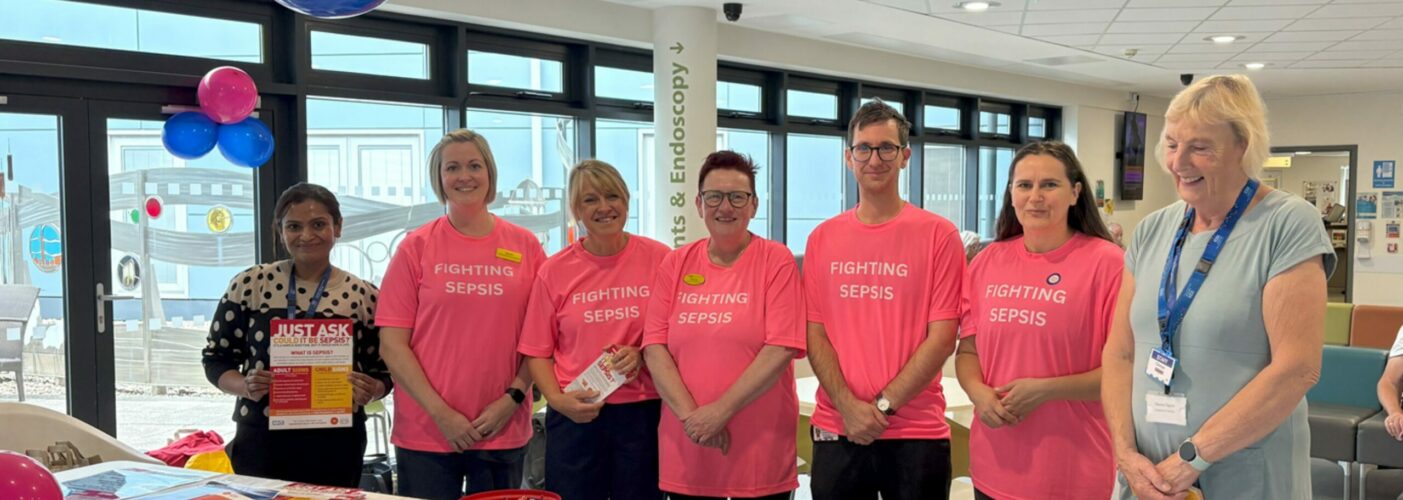
Spotlight
Somerset United against Sepsis
Last year, every 29 hours someone died in Somerset with Sepsis as the cause or contributing factor on their death certificate.
To raise awareness of Sepsis and how to spot the symptoms and in support of World Sepsis Day last month (13 September), our Sepsis team organised an event at Bridgwater Community Hospital for patients and colleagues alike to share the signs everyone should look out for and where to find support if you are concerned.
To showcase that the fight against Sepsis is a true team effort, colleagues from across Somerset FT made sure to stand united in bright pink football strips.
“As well as showing that everyone is important in the fight against Sepsis, we knew the football shirts would be a talking point for colleagues, patients and visitors,” says Carmen Marginean, an anaesthesia and intensive care consultant at Yeovil Hospital .
“We’re passionate in supporting patients and colleagues to recognise the red flags that may indicate Sepsis - recognising this early and knowing what to do saves lives. Every hour delay in administering antibiotics can increase the risk of death for our patients.
“Unfortunately, it’s not always obvious, it can be little things or small changes, such as if a patient has an altered mental state, this can be attributed to so many things but is often a sign of Sepsis. We want colleagues and our patients to understand that asking the question ‘Could it be Sepsis’, even if it’s not, is better than not considering at all. A significant number of deaths from Sepsis are preventable and it’s incredibly important to reduce the number of preventable deaths by recognising sepsis and treating it.”
As a consultant microbiologist at Musgrove Park Hospital, Ian Head echoes Carmen’s words: “It’s important to understand that not every infection is Sepsis, but that most cases of Sepsis will start with an infection,” he adds. “Timing is so important, and colleagues and patients need to understand how quickly this can move.
“The trouble with Sepsis is that it can look like so many other conditions, we want to educate patients and colleagues alike to recognise when symptoms or a change in symptoms is an indicator.
“Most people with infection will recover without getting worse, but if you have an infection and it’s a few days down the line and it's not getting any better, or in fact it’s getting worse, it’s important that colleagues across all healthcare providers and patients themselves recognise that this could be the sign of Sepsis.”
The event was a great success with colleagues and patients popping along to find out more. There were fact sheets, video presentations and talks on the signs, symptoms and treatments, with our colleagues’ reassuring patients that if caught early Sepsis can be treated but that it is all about timing.
Vanessa Redwood, our deteriorating patient and sepsis nurse who helped to organise the event, says: “Thank you to the team for coming out and taking the time to help spread the word about Sepsis. This is the first time we’ve brought the message out to one of our community hospitals and it was a great day. Within the first hour I’d spoken to a number of patients who didn’t realise the signs or how quickly it can take hold. For me that’s the whole point of doing events like this, for everyone we get speak to, hopefully they’ll pass the message on to friends and family and Sepsis will start to be recognised much earlier, preventing the illness taking hold.
“Thank you to our colleagues at Bridgwater Community Hospital, they have a wonderful space perfect for chatting with patients, visitors and colleagues and they were really welcoming.”
What is sepsis?
Sepsis is a life-threatening condition that arises when the body’s response to an infection is to injure its own tissues and organs.
Every year, 48,000 people in the UK die of sepsis-related illnesses, a thousand of who are children. These are high numbers and can be prevented if recognised early.
The symptoms to look out for are explained by the UK Sepsis Trust About Sepsis | Sepsis Symptoms | The UK Sepsis Trust
There is one simple question you can ask if someone you know is unwell or that you are caring for just ask: ‘Could this be sepsis’?

